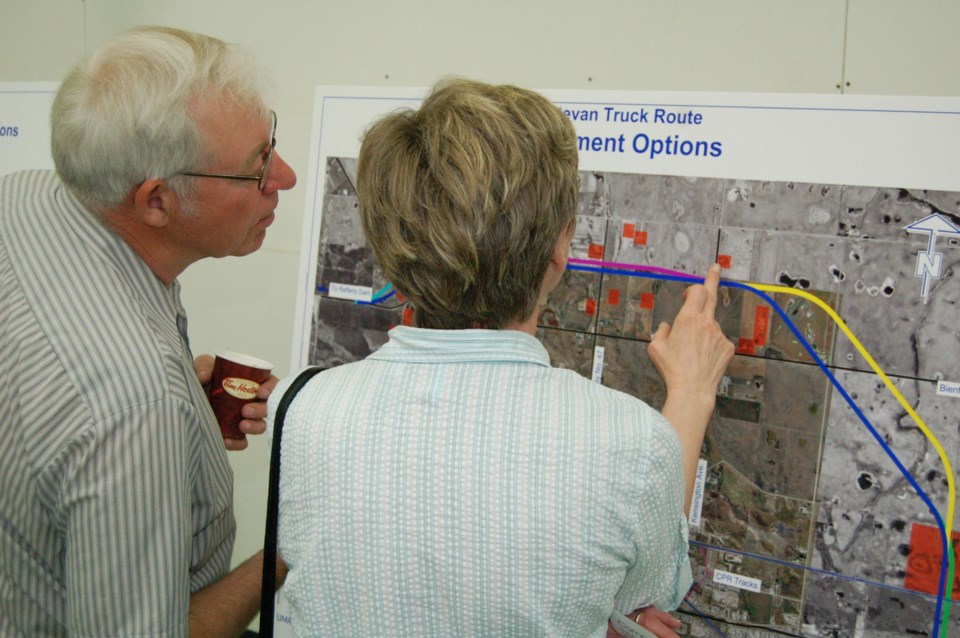The Estevan area commercial truck bypass project continues to be a rather fluid issue for both the Ministry of Highways and Infrastructure and local landowners whose properties will be compromised once design and construction work begins.
Doug Wakabayashi, assistant director of communications for the Ministry, spoke with The Mercury on Oct. 3 and confirmed that just 12 of the 26 landowners affected by the proposed commercial truck route have reached an agreement regarding land evaluation and release.
Wakabayashi said that expropriation is the last measure pursued when issues surface regarding land acquisition
When the process of acquiring land begins, he explained, an independent land appraisal firm is hired. The firm must be an accredited appraisal company certified by the Appraisal Institute of Canada. He said landowners are always welcomed to get their own appraisals done and that the company the Ministry has contracted is required to share their information with any landowner appraiser to ensure that Appraiser A is dealing with the same methodology as Appraiser B, "to make sure that they are comparing apples to apples, that sort of thing," he said.
A re-appraisal was ordered for some of the land in dispute in the Estevan project and they have not been completed yet. Wakabayashi said two appraisals of all the lands in question have been completed so far and if a third appraisal comes in with a higher monetary evaluation, that will be the price used moving forward.
"When expropriate notice is served, the landowners involved still have about two years to challenge. They may choose a mediation route if they don't like the situation they find themselves in within that time frame," he added.
The communications officer added that once the expropriation process begins then Highways and Infrastructure "have an interest in the land, so we will then call for tenders, and we have done that, and it is expected that a contractor will be selected and in place by the end of this month."
The project is getting $17 million in funds from the federal government for the proposed 13-kilometre bypass project.
Asked if a good portion of the proposed bypass is designated as a throwaway highway, a good piece that will be abandoned once an anticipated interchange is constructed to accommodate increased traffic flow and safety concerns, Wakabayashi said the so-called throwaway portion might still be included in a future interchange plan and that planning has been going on since 2008.
"There has been a lot of public and local input into this project and they have been critical to the decision-making. There have been three open house events and separate meetings with key stakeholders and landowners on the west end of the project. In 2011, the RM of Estevan endorsed the agreement," Wakabayashi said.
When it comes to highway building and land acquisition, he said, "we never arrive at an alignment that will leave everyone happy."
That is just the nature of the job that has to be done.
Moving the proposed bypass further north as suggested by some affected landowners, would probably mean lessened use of the bypass option, he said, repeating information provided by the engineering arm of the project. He said they also discerned that the proposed route is not too close to the city itself and could accommodate civic growth.
"The consultants on the project used commonplace engineering practices in making the assessment, but definitely the Ministry can appreciate those concerns. There are ways to work around city growth such as we see in Regina and Saskatoon."
With a contractor in place by month's end, Wakabayashi said some preliminary grading might be able to get underway this fall, weather permitting. He said there wouldn't be a lot of clearing work to complete, so that might be accomplished this fall. The next construction season would see a more full-scaled approach to the project with completion still expected by the 2015-16 fiscal year.
Going back to the acquisition and expropriation question, Wakabayashi said the item becomes tricky because the Ministry has dual obligations.
"It must be fair to the landowners and the taxpayers and somewhere in there it has to find a balance and that's why it's important to reach for fair market value."
The Ministry spokesman added that, "if that process doesn't work, we can't reach an agreement, then there is always the Public and Private Rights Board that can be approached to try and find a solution. So expropriation is, as we said, the last resort."
Wakabayashi said generally speaking 95 per cent of the land deals done with the Highways Ministry aren't done through expropriation and that somewhere along the negotiation trail, a resolution is found.
"We understand this process has been going on for some time," he said.
He said he also understood some landowners have been frustrated with inconsistent communication with the Ministry, and that was unfortunate, but it came about due to some staff turnovers that meant that some people were taken off files and new faces were added.




